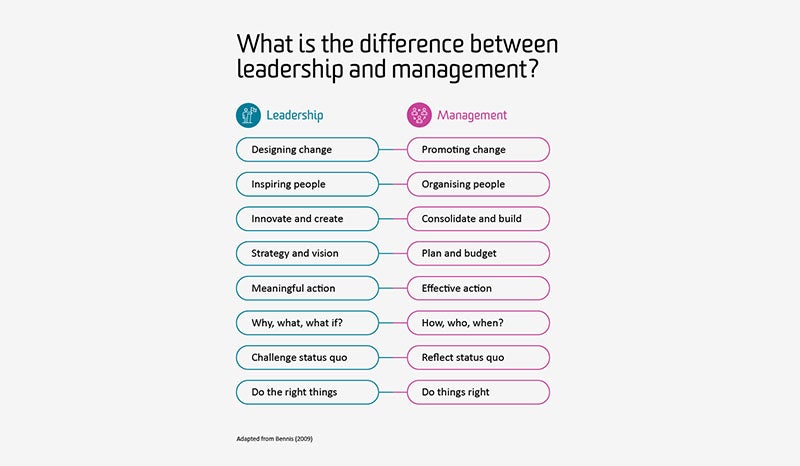Many of the most monumental changes throughout history can be credited to strong leadership and effective management.
From groundbreaking advancements in technology to businesses that break barriers across borders, strong leaders have been at the helm to inspire, guide and innovate alongside management that has ensured effective execution.
But what exactly does a good leader look like, and, most importantly, what is the difference between leadership and management?
Both are critical to organisational success and according to the 2023 Insights Report on Australia’s Best Workplaces, leadership behaviour is the top attribute that makes a great workplace. While the terms are often used interchangeably and there is some overlap, there are a number of key differences between leadership and management.
Knowing how to harness both can provide future-focused professionals with an increasingly needed advantage in a competitive landscape.
In this article, we’ll explore the defining traits of a good leader and a good manager, the core differences between the two, as well as how to master leadership and management to fast-track your career and achieve wider business success.
What is leadership?
Peter Northouse defines leadership as “a process whereby an individual influences a group of individuals to achieve a common goal.”
The responsibilities of a leader include creating a clear vision – even in the face of adversity – and providing direction and reassurance to their teams. Essentially, leaders are the ones who paint the big picture and guide and inspire others toward that vision.
Leadership is less about authority and more about making people believe in something greater than themselves and motivating them to work together to achieve it.
What are the traits of a good leader?
There are several characteristics typically associated with strong leadership, all of which enable strong leaders to influence and inspire their teams effectively. These include:
- Empathy: Being able to grasp, understand and relate to the feelings of others is critical to building strong relationships.
- Creativity: Thinking outside the box to generate innovative ideas and solutions that may not have been considered or tried before.
- Vision: Having the ingenuity, foresight and optimism to craft a clear, strategic direction – and inspire others to follow it.
- Integrity: Advocating for honesty and strong moral principles – and practising what they preach – is a crucial attribute of effective leaders.
- Communication: Capturing the essence of a concept, and sharing ideas and expectations concisely and compellingly.
- Decisiveness: Acting with confidence and making firm decisions without hesitation.
- Adaptability: Adjusting to unforeseen challenges and new circumstances with grace and ease.
What is management?
Management involves planning, organising and coordinating resources to achieve specific outcomes – which in many cases is a leader’s vision.
Managers focus on ensuring goals are met efficiently and effectively through pragmatic execution. The role is more about directing people and resources rather than visualising and inspiring action.
Typically, a manager’s role is to ensure that day-to-day operations run smoothly and that their team is empowered to implement strategies and plans effectively. Managers play a crucial role in maintaining stability, order and practicality within an organisation, ensuring goals are met.
What are the traits of a good manager?
Good managers have characteristics that enable them to coordinate and oversee the efforts of their teams. These traits help maintain productivity, efficiency, and a positive and productive work environment. They include:
- Mentoring: A strong manager provides guidance and support to help their team grow both professionally and personally, because they understand the two are intertwined.
- Delegation: Maintaining productivity by allocating the right tasks to the right people is key to effective management.
- Organisation: Keeping projects structured and in order is non-negotiable.
- Attention to detail: Ensuring accuracy and thoroughness in all aspects of work sets the strongest managers apart. Managers with attention to detail catch mistakes early before they can become a bigger roadblock.
- Accountability: Taking responsibility for outcomes and holding others to the same standard ensures everyone stays on track with the right actions and contributions.
- Problem-solving: Identifying issues and finding effective solutions quickly is integral to managerial and wider organisational success.
- Time management: Efficiently managing the team’s time to meet deadlines and objectives, ensuring that projects are completed according to schedule, and that goals are met.
Leaders:
- Design change
- Inspire people
- Innovate and create
- Focus on strategy and vision
- Emphasise on meaningful action
- Asks why, what, what if?
- Would challenge the status quo
- Do the right things
Managers:
- Promote change
- Organise people
- Consolidate and build
- Focus on planning and budget
- Emphasise on effective action
- Asks how, who, when?
- Would reflect the status quo
- Do things right
Source: Adapted from Bennis (2009)
Leadership vs management: What is the difference?
While the strongest managers are also strong leaders, it’s not always the case – and the most effective leaders within an organisation aren’t necessarily in management positions. There are a number of differences between leadership and management, which have been categorised by industry experts as follows.
Designing change vs Promoting change
Leaders design change - in other words, they create a vision for where their team should be, and then they work to empower their team to make that vision a reality.
Managers promote change by focusing on the practical aspects of workplace change, ensuring the necessary action steps are mapped out and taken to achieve desired outcomes. They typically achieve change in a more controlled, methodical and predictable way.
Inspiring people vs Organising people
Leaders inspire others to share their compelling vision and engage fully with their work in order to achieve it. Fostering a strong sense of purpose and commitment is key here, as leaders build strong relationships and a positive, motivating work environment.
Managers, on the other hand, focus on organising people to ensure tasks are completed efficiently. This involves assigning tasks, coordinating efforts and monitoring progress. Management is about ensuring everyone knows what they need to do and have the resources to do it properly.
Innovate and create vs Consolidate and build
Leaders focus on innovation and creation, seeking new opportunities, challenging conventional ways of thinking and working, and ultimately driving the business to new horizons. Risk-taking and boundary-pushing are not only encouraged but necessary.
Managers are more concerned with maintaining stability to achieve incremental, safe and predictable outcomes. They consolidate and build upon existing structures and processes to optimise operations and keep things running smoothly.
Strategy and vision vs Plan and budget
Strategy and vision are central to strong leadership. Leaders set long-term goals and inspire others to work towards them. They create a broad vision that outlines the future direction of the business and focus on aligning the team’s efforts with its overall mission and values.
On the other hand, the manager’s remit includes detailed planning, budgeting and tactical execution of short-term goals. They develop comprehensive plans that outline specific steps to allocate resources effectively and ensure objectives are met.
Meaningful action vs Effective action
Leaders are concerned with meaningful action. They want to ensure that the work being done aligns with the team's overall vision and has a significant impact on the end result. Their focus is on the bigger picture, establishing and maintaining a sense of purpose for the team to underpin each action they take.
Managers, on the other hand, are focused on effective action - they want to ensure tasks are completed correctly and on time. Efficiency and productivity are at the crux of management, ensuring the team meets its targets and delivers high-quality results.
Why, what, what if? vs How, who, when?
Leaders ask the broad questions: Why is something important? What should be done? And what if new opportunities arise? Strong leaders encourage their teams to think independently and critically, and to explore different possibilities. Their teams are inspired to ask questions and seek innovative solutions.
Managers are concerned with the practical questions: How should things be done? Who should do them? And when should they be completed? Strong managers provide clear instructions to ensure everyone understands their roles and responsibilities. Their teams get things done efficiently.
Challenge status quo vs Reflect status quo
Leadership requires challenging the status quo to develop new goals and ways to achieve them. Seeking to disrupt and improve existing practices is vital to driving the business forward; leaders are largely change agents who push for innovation and continuous improvement, and encourage their teams to do the same.
Management often reflects the status quo, as maintaining and optimising current processes and systems is their priority. Stability and consistency are a big focus for managers, ensuring everything runs smoothly and in line with proven practices.
Do the right things vs Do things right
Leaders emphasise doing the right things to ensure their actions align with the overarching goal of the organisation. Guided by values and principles, they prioritise strategic thinking and long-term success to ensure their actions have a meaningful impact.
Managers, on the other hand, are more concerned with doing things right and ensuring processes are followed to execute tasks effectively. There’s a greater focus on adherence to procedures and achieving operational excellence to ensure things are done correctly and according to plan.
Mastering leadership and management
While there are distinct differences between leadership and management, there are also significant overlaps – both aim to achieve organisational goals, and require strong communication, decision-making and problem-solving skills.
A strong leader needs management skills to bring their vision to life, and a strong manager needs to inspire and motivate their team to invest in their common goal. Mastering the art of both leadership and management is critical for anyone who wants to drive meaningful change and stand out in an increasingly competitive landscape.
Deakin’s online Master of Leadership is designed to help ambitious professionals do exactly that. With flexible learning and a cutting-edge curriculum taught by industry experts, this first-of-its-kind qualification empowers students with everything they need to meet and exceed the demands of tomorrow.
Unlock your potential and become a leader who can manage with precision. Enrol in Deakin's online Master of Leadership to build your existing skills and mindset to prepare you for success in leadership roles.
Discover more about the Master of Leadership or reach out to our team of Course Advisers today.




